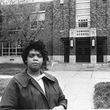Wayne Williams, long considered by many authorities as the prime suspect in the Atlanta Child Murders, has been denied parole. He’s up for consideration again in eight years.
Williams, 61, has maintained his innocence even as he was convicted in 1982 of the murders of two adults and then sentenced to two life terms in prison with the possibility of parole. Prosecutors said he was also suspected of killing more than 20 black children in the Atlanta area from 1979 to 1981, but he was never charged in any child’s death.
The Georgia Board of Pardons and Paroles' decision comes amid new scrutiny on the Atlanta Child Murders. Mayor Keisha Lance Bottoms announced in March that city police and the Fulton County District Attorney's Office would re-examine the cases, with help from the GBI.
Bottoms said she hoped new technology could help old evidence yield answers in the decades-old cases that shook Atlanta for two terrible years. The decision shouldn't be taken as a move supportive of Williams, she said.
“It may be there is nothing left it be tested,” Bottoms said in March. “But I do think history will judge us by our actions and we will be able to say we tried.”
Danny Agan, a retired detective who worked some of the cases for the Atlanta Police Department, said the board’s decision was a good one.
“I’m not surprised at all given all of the facts that are known, how strong his conviction was,” Agan said Monday. “It has held up under years of appeal. There’s no reason to believe the conviction was flawed. In my opinion he is still a threat to society. He’s unrepentant.”
Agan also supports the mayor’s decision to re-examine the cases, as he thinks Williams killed most — but not all — of the children. Specifically, Agan doubts Williams killed the two girls who have long been considered part of the Child Murders list. The other 27 victims were male.
The parole board isn’t required by law to give a reason for its decisions. In a letter to Williams, the board wrote there was “insufficient amount of time served to date given the nature and circumstances of your offenses(s).”
A board spokesman said the board set Williams’ next date of parole consideration to November of 2027. That is as far into the future as the board can push it.
MORE: Attorneys to GA Supreme Court: Man couldn’t have committed 2000 murder
MORE: A Georgia inmate’s final moments and his stepbrother’s loss
MORE: In Georgia, anti-gang push aims at more convictions, longer prison sentences
The decision was made in late November, but as a rule, the board waits until the inmate has been notified to reveal decisions to the media.
DeWayne Hendrix, spokesman for the Wayne Williams Freedom Project, said he wasn’t surprised by the decision.
“In all honesty, they’re just hoping Wayne dies in prison,” Hendrix said. “This case is a political case. It’s always been a political case.”
Police and federal and state agents investigated dozens of suspects as the murders were happening. A few people even confessed, but were eliminated because police believed they were mentally ill and lying. Tips also came in about brothers who were purportedly tied to the Ku Klux Klan. Some victims' survivors remain convinced Williams didn't kill their loved ones.
“Wayne Williams didn’t kill my son,” Catherine Leach-Bell, whose 13-year-old, Curtis Walker, was killed in 1981, told the AJC in an interview in 2018.
Williams was arrested after a May 1981 police stakeout by a bridge over the Chattahoochee River. Officers heard a splash and spotted Williams in a car.
After a body was found, Fulton prosecutors charged Williams, a young freelance photographer, with the deaths of two adults whose remains had been recovered in or near the river.
The state earned his conviction in 1982 by using technology to connect Williams to hairs and carpet fibers found with the bodies. Prosecutors also presented evidence from 10 of the child deaths as "pattern" cases that prosecutors said pointed to Williams guilt in the children's murders.
In 1987, Lewis Slaton, then Fulton County’s district attorney, declined demands by relatives of 13 young victims to either charge Williams in those cases or reopen them. Slaton said at the time he didn’t have enough evidence for convictions, but believed Williams was guilty.
Current Fulton County DA Paul Howard is using a new conviction integrity unit to examine the case. His office declined Monday to give an update on its efforts to re-examine the cases, as did the Atlanta Police Department.






